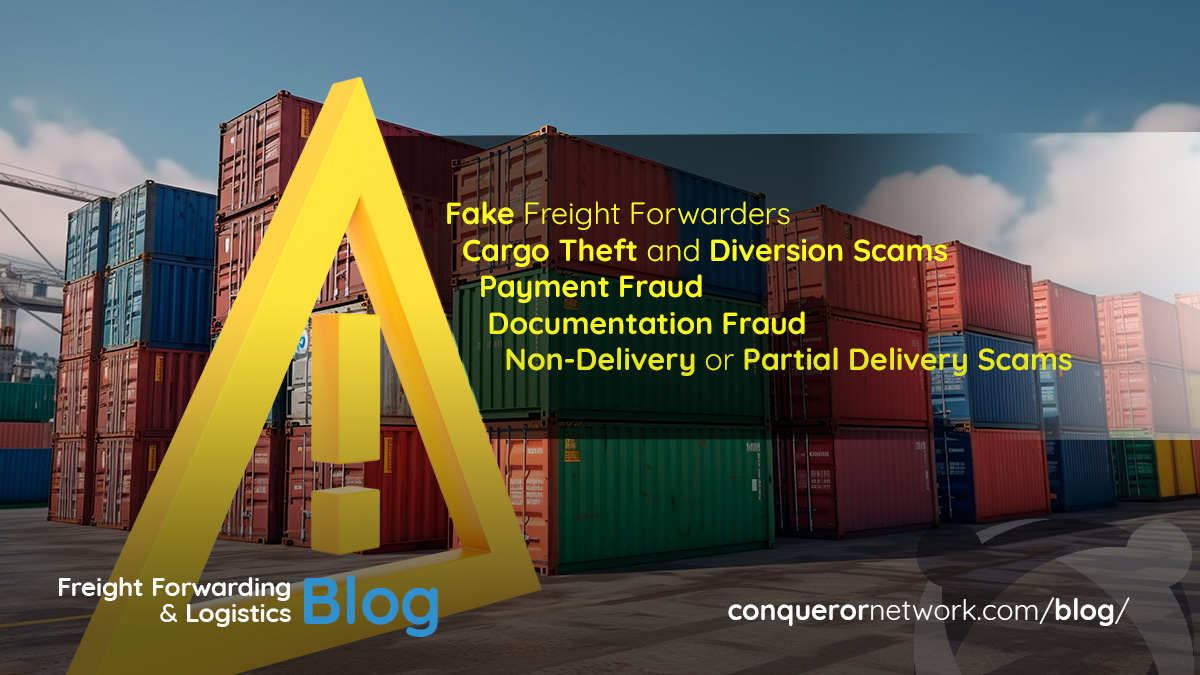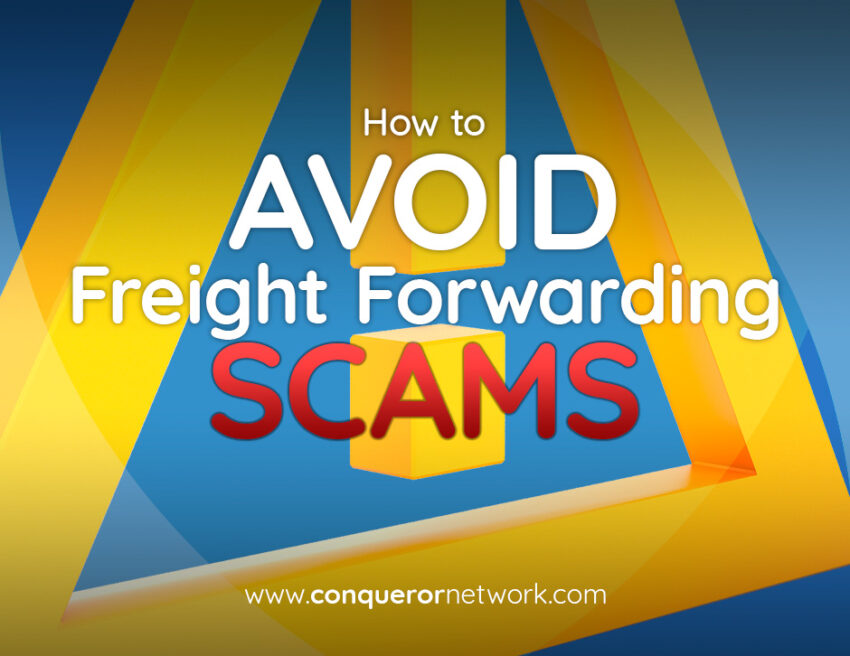The freight forwarding industry plays a crucial role in global trade, helping businesses move goods efficiently across borders. However, as international logistics becomes more complex, the risk of fraud and scams has also increased. Freight forwarding scams can lead to financial losses, shipment delays, and even legal troubles. Whether you’re a shipper, a freight forwarder, or a logistics company, protecting yourself from fraudulent operators is essential for maintaining a trustworthy supply chain.
This guide will walk you through the most common freight forwarding scams, red flags to watch for, and effective strategies to ensure your shipments remain secure.
Understanding Freight Forwarding Scams
Freight forwarding scams come in different forms, but they all have one goal: to exploit businesses for financial gain. Some of the most common types of fraud in the logistics industry include:
1. Fake Freight Forwarders
These fraudulent companies pose as legitimate freight forwarders, offering attractive rates to lure in unsuspecting businesses. Once payment is made, they disappear without ever shipping the goods.
2. Cargo Theft and Diversion Scams
Scammers may arrange to transport goods but reroute them to an unauthorized location. This can happen when fraudulent forwarders partner with dishonest carriers or manipulate shipping documents.
3. Payment Fraud
Fraudulent forwarders may request payments upfront and then fail to provide services. Others may engage in phishing scams, tricking businesses into transferring funds to fake bank accounts.
4. Documentation Fraud
This includes the manipulation of bills of lading, customs documents, and other paperwork to deceive shippers and importers. Scammers may forge documents to overcharge clients or smuggle illegal goods.
5. Non-Delivery or Partial Delivery Scams
Some fraudulent forwarders agree to transport shipments but only deliver part of the cargo. They may claim additional fees are required before releasing the remaining goods.

Red Flags to Watch For
While freight forwarding scams can be sophisticated, there are common warning signs that can help you identify fraudulent operators before it’s too late.
-
Unrealistically Low Freight Rates – If a forwarder offers significantly lower rates than the market average, it could be a scam. Reliable freight forwarding services come with operational costs that make excessively cheap rates suspicious.
-
Lack of a Physical Address or Verified Contact Details – Fraudulent companies often operate online with no verifiable office locations or legitimate phone numbers.
-
No Industry Certifications or Accreditations – Reputable freight forwarders are often members of industry organizations such as FIATA, IATA, or a trusted freight network like Conqueror Freight Network.
-
Poor Online Presence or Negative Reviews – Scammers typically lack a credible online reputation. Checking reviews, testimonials, and third-party references can help assess a company’s legitimacy.
-
Requests for Full Payment Upfront – While deposits and partial payments are common, a demand for full payment before shipping is a potential red flag.
-
Unclear or Incomplete Contracts – Fraudulent forwarders may avoid signing legally binding agreements or providing detailed terms and conditions.
How to Protect Your Business from Freight Forwarding Scams
Preventing fraud in freight forwarding requires a proactive approach. Here’s how you can protect your shipments and financial interests.
1. Work with Verified and Accredited Forwarders
Always verify that your freight forwarder is a member of reputable industry organizations such as:
-
FIATA (International Federation of Freight Forwarders Associations)
-
IATA (International Air Transport Association) for air freight agents
-
National and regional freight forwarding associations
-
A recognized logistics network like Conqueror Freight Network
2. Conduct Thorough Due Diligence
Before partnering with a freight forwarder, perform a comprehensive background check:
-
Verify their company registration through official government business registries.
-
Check their operating licenses and industry accreditations.
-
Review their client testimonials and case studies to gauge their reputation.
If a company refuses to provide proof of legitimacy, consider it a red flag.
3. Use Secure Payment Methods
Avoid wire transfers to unknown accounts and always use traceable payment methods such as:
-
Bank transfers to verified business accounts
-
Escrow services for large transactions
-
Letters of credit when dealing with high-value shipments
Be cautious of any forwarder insisting on full payment upfront without a contract or service guarantee.
4. Verify Freight Forwarder Insurance
Legitimate forwarders provide insurance coverage for shipments. Ask for proof of insurance, such as:
-
Freight liability insurance
-
Cargo insurance
-
Errors and omissions insurance
A lack of insurance coverage can indicate a lack of professionalism or a potential scam.
5. Use Smart Contracts and Blockchain for Transparency
Technology is playing a growing role in fraud prevention. Blockchain-based smart contracts allow real-time tracking of shipments and prevent document tampering. Some freight companies are already adopting blockchain to ensure secure, transparent transactions.
6. Always Double-Check Shipping Documents
Ensure that all shipping paperwork, including bills of lading, invoices, and customs documents, is verified and legitimate. Fraudulent forwarders often manipulate these documents to extort additional fees or divert cargo.
7. Join a Trusted Logistics Network Like Conqueror Freight Network
One of the most effective ways for freight forwarders to safeguard their business against scams is by being part of a well-established logistics network like Conqueror Freight Network. Conqueror’s strict selection process ensures that all members are financially secure, experienced, and trustworthy. Additionally, the network offers an optional Payment Protection Plan, which totally safeguards members from potential financial risks. By working with vetted partners, freight forwarders can build long-term, secure business relationships while reducing the likelihood of fraud. In an industry where trust is everything, being part of a reputable network like Conqueror provides credibility, security, and access to reliable agents worldwide.
Not a member yet? Join us today!
What to Do If You’ve Been Scammed
If you suspect fraud or have fallen victim to a freight forwarding scam, take immediate action:
-
Report the fraud to industry organizations like FIATA or IATA.
-
Contact law enforcement if large sums of money or goods are involved.
-
Alert your bank and request a reversal if the transaction was recent.
-
Warn others by leaving reviews or posting in freight forwarding communities.
Final Thoughts
Freight forwarding scams pose a significant risk to businesses involved in global trade. However, by staying vigilant, conducting proper due diligence, and partnering with reputable logistics providers, you can safeguard your shipments and financial interests.
Freight forwarders who are not yet part of an established logistics network should consider joining a trusted organization like Conqueror Freight Network to gain access to a vetted community of reliable partners, financial protection, and industry-leading support. In an industry where trust and security are critical, working with a reputable network is one of the best ways to avoid fraud and build long-term success.


